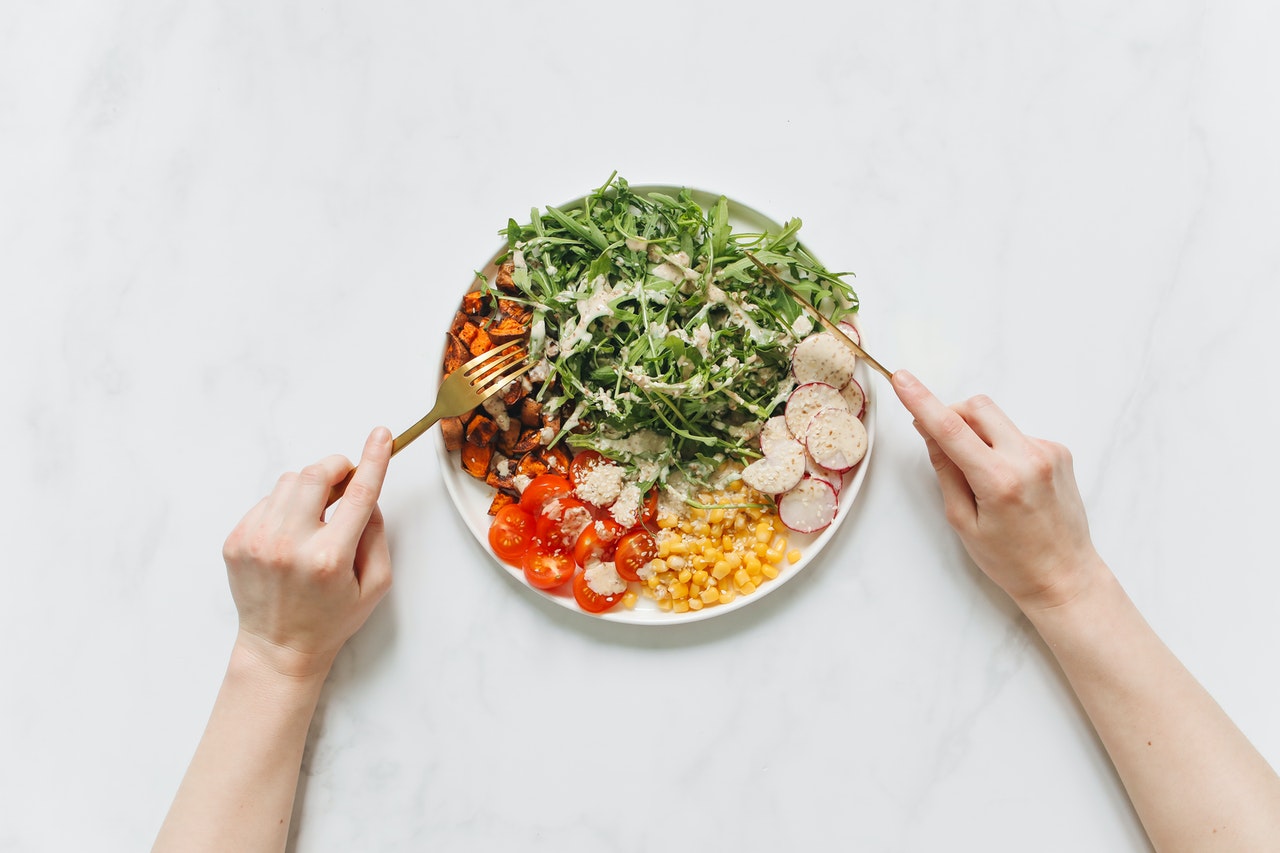Craving Salty, Sweet, Fatty And Fried Food? It Could Be Your Hormones


When we think of a “vice”, we might think of a habit such as smoking, drinking, or gambling. But what about food as a vice? Can one’s diet be looked at as a bad habit, or just a trivial failing?
Just like certain vices, eating food that is ultimately bad for us is often a lot more fun while it’s happening… it’s not as enjoyable a few hours later when we collapse in a food coma.
Consequences from giving in to our food cravings can be quite varied. Perhaps you have heard a person say that they lose weight when they are stressed out, while others may proclaim they put on weight when faced with the same predicament.
There is a reason for this, and it often comes down to hormones. (3)
Cortisol And Food Cravings
Stress can suppress our appetite in the short term. The nervous system instructs the adrenal glands, which are located on top of the kidneys, to release the hormone epinephrine (also known as adrenaline). Epinephrine aids in the activation of the body’s fight-or-flight reflex, a heightened physiological condition that temporarily halts the feeling of wanting to eat. (1,3,4,15)
But it’s a different story if tension continues. Feelings of anger, envy, defeat, and other negative emotions activate the cortex of the adrenal gland, which then releases the hormone cortisol.
Cortisol levels can (and should) drop after a stressful episode, but if the stress or bad feeling doesn’t go away – or if a person’s stress response is stuck in the “on” position – cortisol levels may stay high. (1, 3, 4 )
Cortisol also increases motivation in general (including motivation to eat.) Cortisol can make us crave salty, sweet, and fried foods, which provide a rush of energy and pleasure. The more uncontrolled tension we have in our lives, the more likely we are to seek emotional relief through food. (1, 2)
This is not dangerous in small doses, however, prolonged resentments, fear or sadness, or any similar affiliated feelings can produce so much cortisol that our physical health can also be affected. (1)
The Emotional Link
We’ve all been in situations where we turn to comfort food to ease our emotional pain. But with stress at the root of certain cravings, it can be a vicious cycle. The more stressed we feel, the more we crave these kinds of foods. Sometimes we reach for comfort foods unconsciously. Other times, we know exactly what we’re doing when we hit the drive-thru. One thing is for certain, emotional eating can sabotage your healthy eating goals and a whole lot more. (10, 17)
The excess, or surplus stress hormones adrenaline and noradrenaline mentioned above, can enter the arterial system, contributing to the formation of plaque build-up. This is a second catch, whereby depression and stress can promote obesity by altering metabolic responses to high-fat meals in ways that promote obesity. (2, 6, 15)
We burn fewer calories if we are stressed than if we are not stressed, after eating a high-fat meal. Researchers claim that having one or more stressful events the day before consuming only one high-fat meal (the kind we’re most likely to consume while stressed) can slow the body’s metabolism to the point where we can gain up to eleven pounds in a year. (3, 5, 6)
The excess stress hormones adrenaline and noradrenaline that were mentioned earlier, can enter the arterial system, contributing to the formation of plaque build-up. This is a second catch, whereby depression and stress can promote obesity by altering metabolic responses to high-fat meals in ways that promote obesity. (2, 6, 15)
Research shows that after eating a high fat meal we burn fewer calories if we are stressed than if we are not stressed. Researchers claim that having one or more stressful events the day before consuming only one high-fat meal (the kind we’re most likely to consume while stressed) can slow the body’s metabolism to the point where we can gain up to eleven pounds in a year. (3, 5, 6)
If we’re not careful, our emotions can begin to inform our eating habits to the point where we don’t even realize it when we reach for sweet treats because ______ happened. Where emotional eating is concerned, nearly anything can become a trigger… some people eat when they are happy, others when they are sad, we’re all a little different. But it’s important to get a handle on what we reach for and why so we can take charge if necessary. (17)
What Do You Reach For?
Many people have a sweet tooth, while others have more of a “salt tooth”, preferring potato chips and cheese doodles to ice cream cones and fun dip. Do you ever wonder why we have the cravings that we do? Like so many other things having to do with hormones, our cravings tend to be signals from our bodies:
- Animal studies from the University of Florida show eating salt reduces the amount of stress hormones including cortisol produced during psychological stress. According to one of the lead researchers, Eric Krause, Ph.D., a similar effect occurs in humans as well. (7,8)
- Some of the stress-relieving properties of sweet foods appear to depend on its pleasurable and rewarding properties, particularly when it is offered in limited amounts. In one study, rats who were given brief access to a small amount of palatable sucrose solution significantly reduced their cortisol secretion in response to an acute stress condition. (6,7,9,10)
- Another hormone, ghrelin – the so-called “hunger hormone” – activates a primal reaction from our caveman days, according to researchers at UT Southwestern Medical Center. Hunger hormone-induced cravings gave our forefathers a survival advantage since they consumed high-calorie foods that made them more effective hunters. We don’t need the extra calories nowadays because we don’t have to forage for food anymore. (12, 14)
Healthy Alternatives
Now that we understand a little better, what’s at the root of salty, sweet, fatty, fried cravings, the next step is to do something about it… naturally. The next time you’re experiencing one of the typical unhealthy cravings, stop for a moment and take stock of what’s happening, how you’re really feeling, and tune in to your body to see what it needs. Try some of these healthy alternatives instead of giving in to the craving, and see how you feel afterward:
- A healthy snack for salt cravings could be sprinkling some sea salt on slices of cucumber, carrots, or tomatoes to get a salty, crunchy fix without worrying about your waistline. (5)
- Instead of chocolate or another sticky cake, try fruit instead. If still not sweet enough, try adding a substitute such as honey, stevia, or agave nectar, to kick that craving. (9, 11)
- Try new foods such as tempura, schnitzel, different fish, or perhaps yam – instead of potatoes. Always grill or bake food, or invest in a healthy air-fryer. (13)
Whatever way you choose to satisfy your craving, be sure you’re giving your body high quality whole foods that will impart the good stuff your body’s really craving.
Cortisol and Food Cravings Can Affect The Immune System
It’s safe to say that a healthy immune system also has a healthy amount of natural killer (NK) cells. Natural killer cells are one of the leukocyte subsets, particularly responsive to physiological and psychological stress. When necessary, they destroy dangerous and abnormal cells in our bodies, so NK cells act as watchdogs over our immune system. (16)
But when too much cortisol is released by the adrenal gland, not only does it prompt those salty, sweet, fatty, fried food cravings, but it also suppresses NK cells. It gets you coming and going: perhaps you give in to your emotional eating cravings, and order the pepperoni pizza. Later, you find that the food hangover you encounter isn’t the only thing making you feel terrible. Your body may actually be feeling a little off, no thanks to the cortisol. (16)
So as well as keeping our weight down to stay healthy, it’s important to know that by keeping our cortisol levels from rising (and staying there), our immune system benefits also. (1, 16)
How To De-Stress And Re-balance Cortisol
The world we live in is loaded with potential stressors, ways to spike that cortisol. But that doesn’t mean you have to feel stressed out, or let it get the best of you. Your mental and emotional well being is important to your overall health, and it deserves attention. You deserve the best care you can provide for yourself in any moment that you feel stress creeping in. Give some of these a try:
- Keep an emotional eating diary to identify any triggers
- Get plenty of sleep
- Examine deeply any emotional problems, or seek therapy if needed
- Meditate
- Get regular exercise. Try Tai-Chi, Yoga, or Pilates
- Find a creative hobby you enjoy such as poetry, painting, writing, or journaling
- Make sure you have a social support system
- Have a belief in something sacred, holy, or spiritual
- Cultivate gratitude
- Find humor in everyday situations (1, 2, 4)
We are all ultimately responsible for our good health. There are many things we can do to fortify our body’s natural immune system to ward off disease, slow down degenerative aging processes, and deal with stress more effectively. Keeping ourselves healthier by not giving in to our hunger hormones is a perfect place to start. If you need help in this area, click here to learn more about what you can do.
This may be a big hurdle to cross when initially starting to eat healthier, but the benefits of simple and powerful concepts regarding how to recognize and ignore food cravings can be well worth it to stay in control of our health.
Sources:
- https://www.unm.edu/~lkravitz/Article%20folder/stresscortisol.html
- http://www.umusa.net/wellnessprograms/medicalweightloss/handouts/Emotional%20Eating.pdf
- https://health.clevelandclinic.org/how-stress-can-make-you-eat-more-or-not-at-all/
- https://www.health.harvard.edu/staying-healthy/why-stress-causes-people-to-overeat
- https://pubmed.ncbi.nlm.nih.gov/25034950/
- https://www.ncbi.nlm.nih.gov/pmc/articles/PMC4214609/
- https://www.sciencedaily.com/releases/2011/04/110405175012.htm
- https://www.menshealth.com/nutrition/a19523294/why-you-crave-salty-snacks-when-youre-stressed/
- https://www.ncbi.nlm.nih.gov/pmc/articles/PMC4787559/
- https://www.pnas.org/content/107/47/20529
- https://www.healthline.com/nutrition/natural-sugar-substitutes
- https://www.eurekalert.org/pub_releases/2011-06/usmc-gli062211.php
- https://www.healthcastle.com/healthy-alternatives-world-famous-fried-foods/
- https://www.ncbi.nlm.nih.gov/pmc/articles/PMC5373497/
- https://www.hopkinsmedicine.org/health/conditions-and-diseases/adrenal-glands
- https://journals.plos.org/plosone/article?id=10.1371/journal.pone.0188108









